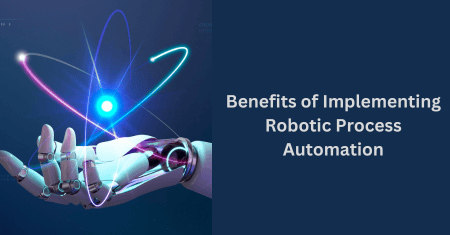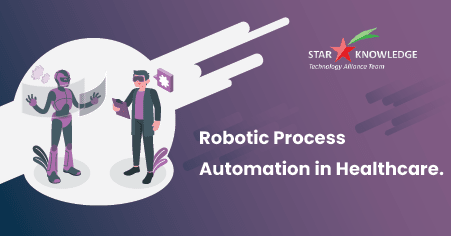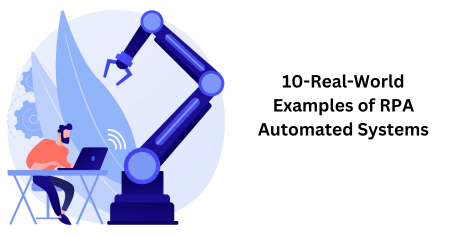
03 Jul Benefits of Implementing Robotic Process Automation
03 July 2023

Robotic Process Automation (RPA) revolutionizes the way businesses operate, offering a myriad of benefits across various industries. RPA streamlines repetitive, rule-based tasks by automating them with software bots, freeing up valuable human resources to focus on more strategic activities. The advantages of RPA are manifold. Firstly, it enhances operational efficiency, minimizing errors and accelerating task completion, leading to improved productivity and cost savings.
Secondly, RPA enables enhanced scalability, as it can effortlessly handle increased workloads without requiring additional manpower. Moreover, RPA promotes accuracy and compliance by reducing human error and ensuring adherence to regulatory requirements. Lastly, it empowers organizations to deliver exceptional customer experiences through faster response times and reduced processing cycles.
Overall, RPA empowers businesses to achieve unprecedented levels of efficiency, agility, and competitiveness in today’s rapidly evolving digital landscape.
Let us take a snapshot of important advantages of robotic process automation
- Increased Productivity
One of the primary benefits of RPA is the significant increase in productivity. By automating mundane and repetitive tasks, employees can focus on more strategic and value-added activities. RPA bots work tirelessly 24/7, completing tasks at a fraction of the time it would take a human worker. This enables businesses to accomplish more in less time, leading to enhanced productivity and output.
- Cost Savings
Implementing RPA can result in substantial cost savings for organizations. By automating tasks that were previously performed manually, businesses can reduce labor costs and minimize the need for additional workforce. RPA eliminates the need for hiring and training new employees for routine tasks, saving both time and money. Moreover, the reduction in human error decreases the likelihood of costly mistakes and rework.
- Improved Accuracy and Quality
Human errors can have detrimental effects on business operations. RPA eliminates the risk of errors associated with manual data entry and other repetitive tasks. Bots perform tasks with precision and consistency, ensuring accuracy and maintaining high-quality standards. By minimizing errors, businesses can enhance customer satisfaction, reduce rework, and avoid costly penalties or compliance issues.
- Enhanced Customer Experience
Delivering an exceptional customer experience is crucial for businesses to stay competitive. RPA plays a vital role in improving customer experience by streamlining processes and reducing response times. With RPA, organizations can automate customer support tasks, such as data retrieval or order processing, leading to faster and more efficient interactions. This ultimately enhances customer satisfaction and loyalty.
- Scalability and Flexibility
As businesses grow, the demand for scalability and flexibility becomes increasingly important. RPA provides the ability to scale operations rapidly without significant infrastructure or resource investments.
By deploying additional bots, organizations can quickly adapt to changing business needs and handle increased workloads. RPA also allows businesses to easily reconfigure processes and workflows to accommodate evolving requirements.
- Enhanced Analytics and Reporting
RPA offers numerous benefits when it comes to harnessing the value of data for businesses. By leveraging RPA technology, organizations can extract and analyze data from various sources with ease.
RPA bots excel at collecting, consolidating, and analyzing data in real-time, enabling businesses to gain valuable insights that inform their decision-making processes. With the added advantage of advanced analytics and reporting capabilities, organizations can identify trends, optimize their processes, and make data-driven decisions to achieve better business outcomes. RPA truly empowers businesses to unlock the full potential of their data.
- Regulatory Compliance
Compliance with regulations and industry standards is a critical aspect of business operations. RPA helps organizations ensure compliance by automating processes with built-in rules and controls.
By standardizing processes and eliminating human errors, RPA reduces the risk of non-compliance and associated penalties. Additionally, RPA provides detailed audit logs and documentation, simplifying regulatory reporting requirements.
- Employee Satisfaction and Engagement
RPA takes over repetitive and mundane tasks, freeing up employees to focus on more meaningful and challenging work. This not only increases job satisfaction but also enhances employee engagement.
With RPA handling repetitive tasks, employees can utilize their skills and expertise in areas that require human judgment and creativity. This fosters a more fulfilling work environment and promotes employee retention.
- Faster Return on Investment (ROI)
Implementing RPA can lead to a rapid return on investment due to the cost savings, increased productivity, and efficiency gains. By automating tasks, organizations can achieve ROI in a relatively short period.
RPA implementation also allows businesses to allocate resources to more strategic initiatives that drive revenue and growth, further accelerating the ROI.
- Competitive Advantage
In today’s competitive business landscape, gaining a competitive advantage is essential for success. RPA enables organizations to streamline operations, reduce costs, and deliver exceptional customer experiences. By embracing automation, businesses can differentiate themselves from competitors and position themselves as industry leaders. RPA empowers organizations to stay ahead of the curve and adapt to changing market dynamics.
Read More: Essential RPA Implementation Best Practices for SuccessConclusion
Implementing Robotic Process Automation (RPA) offers numerous benefits for businesses, ranging from increased productivity and cost savings to improved accuracy and customer experience. By leveraging automation technology, organizations can optimize processes, enhance decision-making, and gain a competitive edge. Embrace the power of RPA and transform your business for the better.
Ready to unlock the RPA benefits for your organization? Contact us today for a Robotic Process Automation consulting services and discover how RPA can revolutionize your business processes.
Our Related Posts
RPA in Healthcare
RPA adoption in the healthcare sector is not widespread yet but is expected to reach 5bn USD by 2024. As....
10-Real-World Examples of RPA Automated Systems
Robotic Process Automation (RPA) has emerged as a powerful technology that automates repetitive tasks and ....
How Microsoft AI Builder is Revolutionizing Business Automation
In today’s rapidly evolving digital landscape, businesses are constantly seeking innovative solutions to....









No Comments